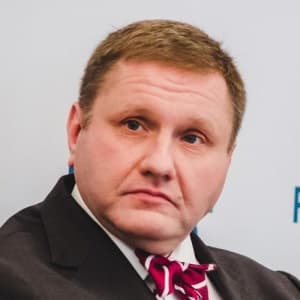Konstantin von Eggert
Commentator, Deutsche Welle
Nearly twenty years ago I was discussing political developments in Ukraine with Oxford University professor James Sherr in London. In a fashion, typical of many Russians at the time I dismissed Russia’s southern neighbour as a ‘corrupt mafia state’ that lags my own country in every sense, including its politics. ‘I think you are very wrong, - said Mr Sherr, - Ukraine’s democracy is not perfect and the elite is indeed corrupt but there is one important thing that makes it different from Russia – it has had a peaceful democratic transfer of power in 1994, when Leonid Kravchuk lost presidential election to Leonid Kuchma and stepped down to become a simple MP. This is a crucial example for a society coming in from the Communist cold. You shall see – the Ukrainians will go on to set an example for Russia’.
Well, James Sherr was right and I was wrong. After all these years Russia is still to see a president loose and election and quietly leave as Mr Kravchuk did. The country still is to return even to chaotic but genuine parliamentarianism of the 1990s when the State Duma was a real forum for debating national issues. It also still is to see emergence of a civic society on par with Ukraine – energetic, brave and creative. My country today clearly trails Ukraine, Georgia and even its closest ally Armenia as far as democratic development is concerned. I am not idealising or me developments in these countries and clearly see the dangers, emanating from both domectic corruption, voter fatigue and external interference. Still history of what used to be called ‘the post-Soviet space’ proves, in my view: if the elections are at least relatively free and competitive the societies and political systems have a chance of bouncing back against authoritarianism and corrupt elites. This is the first lesson to be drawn for my own country – Russia.
Another major factor in maintaining democracy is, unsurprisingly, media freedom. No one expects it to attain British or German level of independence, objectivity and influence – it takes time. But, looking at its more democratic neighbours, there is a second lesson for Russia and the Russians: even oligarchical media ownership is preferable to state monopoly. A diversity of biased and big business dependent media still provides for a diversity of opinions and competition that state domination annihilates. Journalists and societies should ‘aim for the stars’ but be patient and clever in using even imperfect media landscapes in the interests of advancing democracy.
Finally, a third lesson. It is specific to Russia. Soviet-style neo-imperialist ambition hurts democracy as much if not more than oligarchy and corruption. Denial of sovereignty and independent decisions to neighbours inevitably leads to curtailment of democratic rights at home. Those in Russia who celebrated Vladimir Putin’s war with Georgia in 2008, his annexation of the Crimea and de facto invasion of Eastern Ukraine in 2014 now find themselves helpless and defenceless when confronted with realities of the police state that emerged in Russia in recent years.
While Ukraine, Georgia and Armenia are by now used to political change, even if a rough one, a lot of Russians will have to go back to square one and learn the basics of democracy as the previous generation did in the late 1980s – early 1990s, at the time of the great anti-Communist revolutions.
It may sound paradoxical to many but when the Putin regime finally leaves the stage (as it will) Russia may have to look to its once despised neighbours for inspiration – as this writer does today.
Konstantin Eggert Hin MBE is a Russian affairs columnist for DW.
Author of the article is Konstantin von Eggert, who will attend the 22nd Forum 2000 Conference.
The Forum 2000 Conference along with other gatherings takes place in Prague and a number of other cities.
Since 1997 the conference has attracted a wide array of illustrious personalities, Nobel prize laureates, former and current politicians, businessmen, and many others. Their common experience is carrying the weight of responsibility.

Commentator, Deutsche Welle